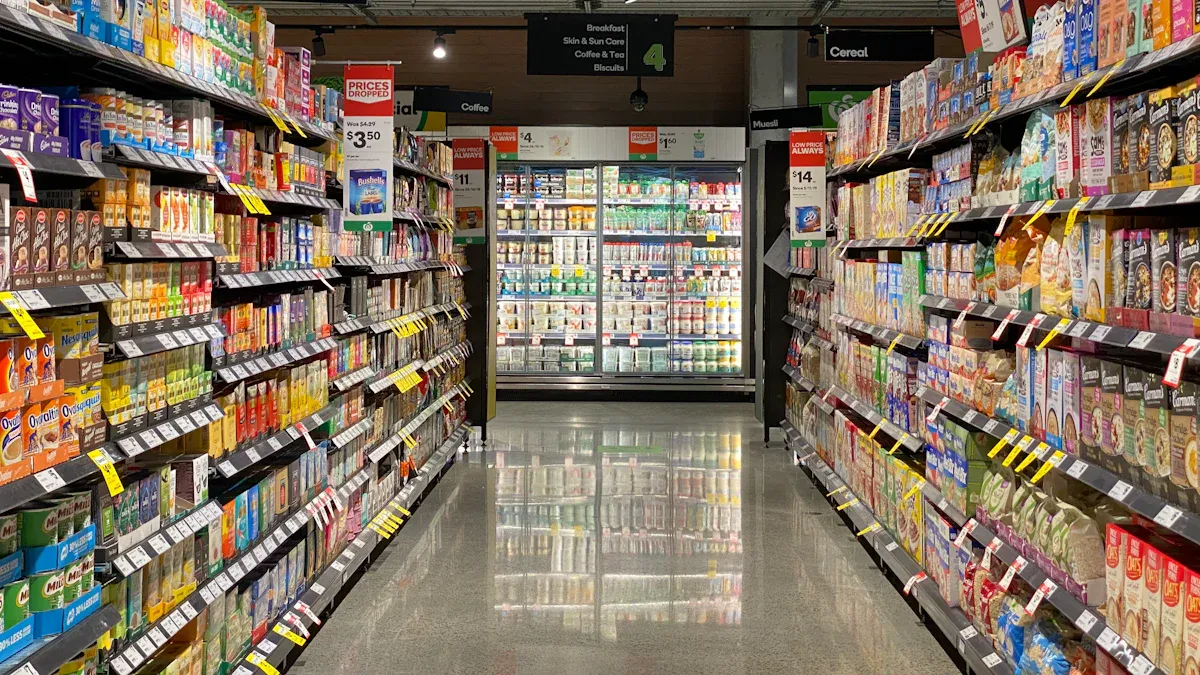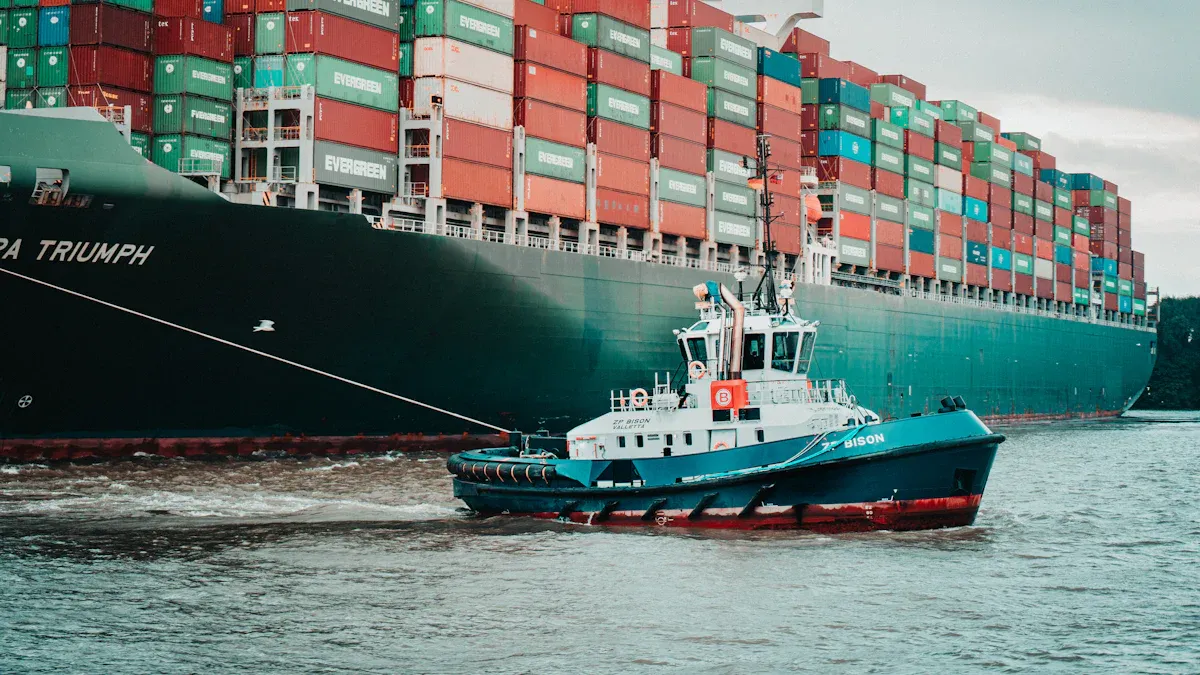The Hidden Costs of Geopolitical Tension for Unmanned Retail

You pay extra costs when countries face geopolitical tension. These tensions can disrupt your supply chain. You may spend more money and adhere to new regulations. Your unmanned retail business can be negatively impacted by these changes. Check the table below to see how countries manage these risks:
Country | Risks |
|---|---|
Mexico | There are security risks like cargo theft. Nearshoring can make security rules stricter. |
Turkey | There are problems between countries. Prices can fluctuate significantly. Turkey’s location can hurt its reputation. |
Russia | There are substantial risks from sanctions. It is challenging to conduct business after the Ukraine invasion. |
General | Prices increase. It takes longer to receive supplies. There are more regulations and trade barriers. Acquiring supplies becomes more difficult. |
Many business leaders are currently feeling these issues:
76% want to invest more in new technology to address these challenges.
65% seek better training for workers to prepare for future risks.
You need effective risk management and resilience to keep your business operating smoothly in this evolving landscape.
Key Takeaways
Geopolitical tensions can mess up your supply chain. This can cause delays and make things cost more. Watch global news to react fast.
Use different suppliers and shipping ways to lower risks. This helps keep products in stock for your customers.
It is important to plan for risks. Make emergency plans and update them often. This helps your business handle surprises.
Spend money on technology and training to make your business stronger. This helps your team deal with new risks well.
Keep an eye on tariffs and compliance costs. Change your prices to keep making money even if costs go up.
Geopolitical Tension and Supply Chain

Sourcing Disruption
It is hard to get products for unmanned retail. Geopolitical tension can change trade routes very fast. Shipments might not arrive for weeks. You may pay more because tariffs and sanctions raise costs. The U.S. and China tensions and the war in Ukraine make supply chains hard to predict. You need to watch global policies and keep supplier options open. This helps you adjust quickly when things change.
Tariffs on Chinese goods have made drones cost more in the U.S. Many drone parts and whole drones come from China. These extra fees make it more expensive for importers, retailers, and buyers.
Recent trade data shows a trend. U.S. importers are buying fewer Chinese drones. They are looking for other places to buy drones.
Trade restrictions make you search for new suppliers. You might need to offer different products or pay more. These changes can lower your profit and make it harder to sell new technology in your stores.
Inventory Shortages
Geopolitical tension slows down getting products. You see more empty shelves and not enough stock. When shipments are late or stopped, you cannot fill your unmanned retail locations. It is hard to meet what customers want. Tariffs make keeping enough products even tougher.
76% of U.S. retailers have seen more empty shelves or shortages.
59% say tariffs make it harder to keep enough inventory.
You need to plan ahead and find new ways to manage stock. You might order sooner or keep extra products. Sometimes, you must tell customers why items are missing. These shortages can hurt your reputation and make customers shop somewhere else.
Geopolitical tension causes many supply chain problems. You must stay flexible and ready to change how you get and keep products. This helps your unmanned retail business work well, even when things are uncertain.
Financial Impacts

Tariffs and Costs
When countries have problems, costs can go up fast. Tariffs on unmanned retail products, like drones, can rise a lot. For example, the tariff on drones reached 170% during tense times. Before, it was only 25%. These changes usually happen because of trade rules with China.
You also need to pay for insurance and following rules. These costs can lower your profits if you do not plan. The table below shows how these costs can hurt your business:
Cost Type | Estimated Cost Range | Impact on Profitability |
|---|---|---|
Pilot certification | $200–$1,000 per pilot | Raises fixed overhead, lowering your margins. |
Liability insurance | $500–$1,000 + 8–12% of value | Directly impacts pricing and overall profitability. |
Compliance planning | N/A | Adds to operational costs if not included in your pricing. |
You must add these costs when you set prices. If you forget about compliance, you might make less money. Good insurance helps keep your business safe and your profits steady.
Pricing Instability
Geopolitical tension can make prices change a lot. Energy and shipping can cost more very quickly. This means customers may have to pay higher prices. Retailers like you find it hard to keep up. When prices go up, people may buy less, and your sales can drop.
Currency changes are also important. You need a smart way to set prices. Here are some ways currency swings can affect your business: They can change how much money you make or spend. Fast changes can mess up your prices and plans. If prices jump around, customers may stop shopping with you. Bad pricing can even make your business close.
You should watch world news and change your prices when needed. This helps you stay strong and protect your unmanned retail business from big surprises.
Operational Resilience
Technology Access
You need good risk management to keep your unmanned retail business safe. When countries argue, it can be tough to get the technology you want. Supply chain problems can slow down shipments of important equipment. Sometimes, you pay more for high-tech products, or you cannot find them at all. You also need to protect your business from threats like corporate espionage.
Real-time tracking tools let you see where your products are. By watching world events, you can act fast if things change.
Export controls and sanctions make getting technology even harder. You must follow strict rules so you do not break the law. Watch for warning signs, like partners who will not share information or change shipping plans suddenly. Always check your customers and partners against official lists to stay compliant.
To build resilience, you should:
Invest in supply chain risk monitoring.
Diversify your suppliers and keep some extra stock.
Labor Challenges
Staffing gets hard when immigration rules change. For example, a new $100,000 fee for H-1B visa applications makes companies look for remote workers instead. You can save money by hiring offshore talent, which often costs 60% less than local hires. Remote work systems built during the pandemic make this easier.
You should:
Use remote hiring to fill important roles.
Train your team to handle new risks.
Work with strategy teams to test your plans for future problems.
If you plan ahead and stay flexible, you can keep your unmanned retail business strong, even when the world feels uncertain.
Strategic Response
Diversification
You can keep your unmanned retail business safe by using smart strategies. If you only use one supplier or one shipping route, you face big risks. Geopolitical tension can make these risks worse. Many companies now use more than one supplier for each product. This is called multisourcing. It helps you avoid running out of products if one supplier has trouble.
You can also try nearshoring. This means getting products from countries that are close by. It lowers the chance of delays and makes your supply chain stronger. Some businesses use different shipping carriers and ways to move goods. For example, if ships cannot go through an area, you can use trucks or planes instead. This helps you keep your shelves full.
Here are some ways to make your supply chain stronger:
Work with more than one supplier for each product.
Get materials from local or nearby places.
Use different shipping carriers and ways to move goods.
Change your supply chain setup fast when new risks appear.
A top unmanned retail company in Europe used these ideas during trade problems. They kept their stores full while others had empty shelves.
Risk Planning
You need good risk planning to keep your business running in hard times. Start by making a business plan for emergencies. This plan helps you keep important work going if something bad happens. You should think about money risks, supply chain problems, and staff issues.
You also need plans for natural disasters and tech problems. For example, set up backup systems for your data and power. Make sure you know what to do if you need to leave or move to a new place.
Best ways to plan for risks include:
Check and update your plans often.
Make your plans fit your business and where you are.
Train your team to follow these plans.
Practice your plans with drills.
Companies that check their plans often are ready for new problems. You can learn from them and keep your unmanned retail business safe and strong.
Geopolitical tension can make unmanned retail more expensive in ways you do not see. You must move fast to keep your business safe. Good planning and risk management help you stay strong. Make your supply chain better by:
Adding another country besides China for suppliers.
Taking charge of more parts of making your products.
Making it easier to track where things come from.
Paying attention to what happens around the world.
Spend money on following rules so you learn problems early and do not get fined. Talk often with rule makers and teach your workers what to do. Be ready to change and care about the environment so your business stays healthy.
FAQ
What is the biggest risk from geopolitical tension for unmanned retail?
You face supply chain disruptions as the biggest risk. These disruptions can delay shipments and cause product shortages. You may also see higher costs and new rules that make it harder to run your business.
How can you prepare for sudden supply chain problems?
You can build a backup plan. Keep extra inventory and work with more than one supplier. Watch global news for early warnings. This helps you act fast when problems start.
Do tariffs always increase your costs?
Tariffs often raise your costs, but not always. Sometimes, you can switch to suppliers in other countries. You may also pass some costs to customers. Staying flexible helps you manage these changes.
Why does technology access matter in unmanned retail?
You need reliable technology for your stores to work. Geopolitical tension can block access to new tools or software. If you cannot get updates or parts, your business may slow down or stop.
See Also
Understanding AI-Enhanced Corner Stores for Modern Retailers
The Future of Retail Lies in AI-Driven Stores
How Time Out Stores Are Changing Urban Convenience Shopping
